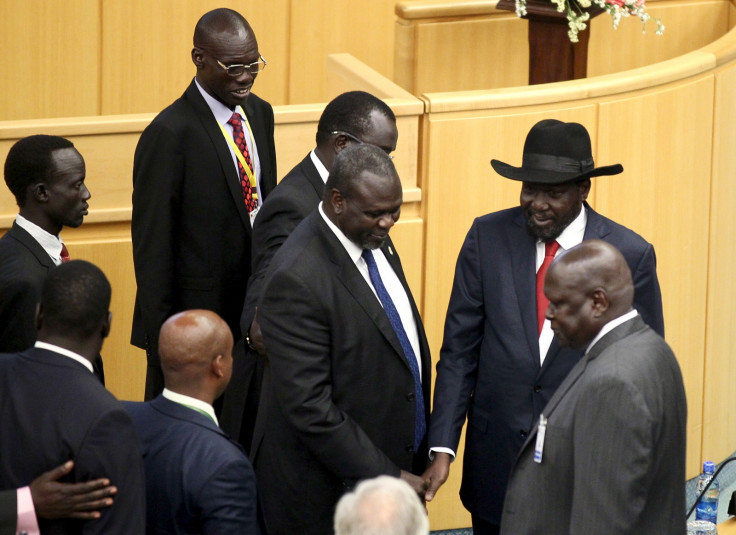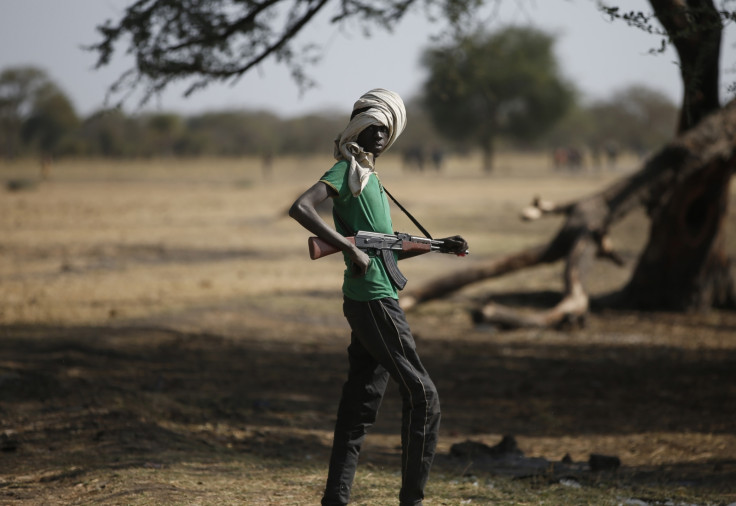South Sudan war: Riek Machar's delayed arrival in Juba will 'undoubtedly' impact peace process

Rebel leader Riek Machar's failure to reach South Sudan's capital Juba will "undoubtedly" have negative consequences on the peace process, a South Sudanese official told IBTimes UK. Machar is currently in Pagak, on the border with Ethiopia. He was due to arrive in the capital on Wednesday 18 April to resume his position of vice-president and form a unity government with President Salva Kiir.
The rebel leader left Juba when a civil war erupted in 2013. His reinstatement is part of a series of measures contained in a peace deal signed in August 2015 aimed at ending the conflict that has caused the death of thousands.
"The Sudan People's Liberation Army In Opposition (SPLM-IO) has not provided any convincing reasons regarding the delay in Riek Machar's return to the country and the delay will no doubt have negative impact on the peace process," Sabit A Alley, South Sudanese ambassador to the UK, told IBTimes UK.
"Not only does it portray the rebel movement's non-commitment to the achievement of peace and stability in the country, but it will also delay the formation of the Transitional Government of National Unity, which is required to implement the requisite reforms and changes stipulated in the Peace Agreement for the Resolution of the Conflict in the Republic of South Sudan. Also, the delay in the formation of the transitional government could easily be exploited by negative forces who are against the Peace Agreement to start causing insecurity in parts of the country," he continued.
Machar's arrival was postponed to 19 April and subsequently cancelled again, with a spokesperson for the rebel leader claiming the delay was due to logistical reasons. The South Sudanese government, however, blamed it on Machar and his chief of staff Simon Gatwech Dual's request to arrive in the capital with more troops and an "arsenal of arms." A request the government has rejected arguing the rebels had already deployed several troops in the capital before their leader's scheduled arrival.
Alley also explained that unconfirmed reports alleged the delay might be due to restrictions and UN sanctions imposed on Dual, who is currently in Gambella, Ethiopia, and is required to travel to Juba ahead of Machar.
"The airlines chartered by Machar's group may not want to go against this UN decision, ergo their refusal to transport the General together with his arsenal or deadly weapons," he said. "The Government has done everything possible to ensure Machar's timely return to the country, but his continuous procrastination clearly goes to show that Machar must be having some hidden agenda which is only known to him and his rebel group. We want to urge the Peace Brokers and the international community in general to bring pressure to bear on the rebel leader to return to the country immediately so that the implementation of the peace process can proceed in earnest. The people of South Sudan need peace now more than ever before," Alley concluded.
'They don't want us to go to Juba'
Machar has denied allegations that he wants to enter Juba with an arsenal and accused the South Sudanese government of blocking his return.
"There are no missiles with them," he told Al Jazeera, referring to the contingent waiting to fly to Juba from Gambella. "There are only light personal weapons, light machineguns. We have agreed to take to Juba 2,910 soldiers and security officers. Up to today we have 1,370 men in place in Juba. There are only 260 soldiers accompanying me. They don't want us to go to Juba. They are obstructing us [from going to] Juba," he continued.

© Copyright IBTimes 2024. All rights reserved.






